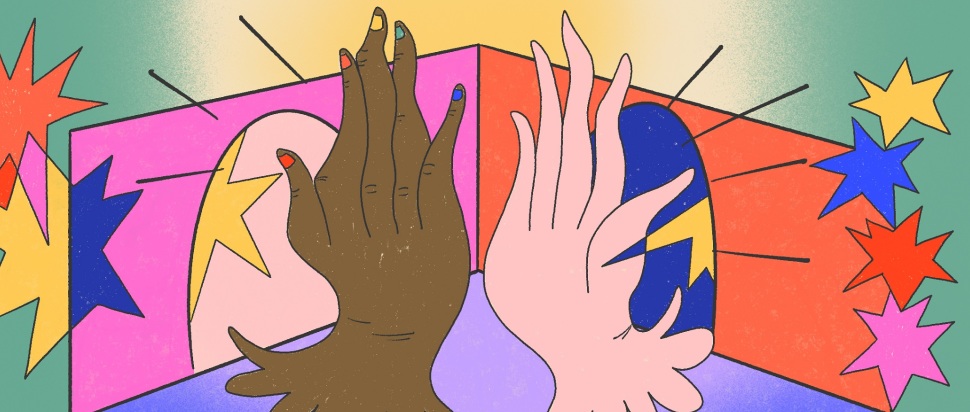United as One: the multi-cause solidarity of queer activism
Summer is nearly done – but solidarity's forever. We speak to queer activist groups about how they're working towards collective political goals and why that means liberation for all of us
On 25 June, in one of many worrying heatwaves this summer, thousands descended on the capital to join Edinburgh’s annual LGBT+ Pride parade. This year, the crowd splintered – rather than marching from Holyrood to Bristo Square, a few hundred protestors diverted to Waverley Station to join striking railway workers on the picket line.
This breakaway group grew from the Radical Bloc, a collaboration between local activist groups who reject the hypocrisy of corporate pride. One member of Edinburgh’s Green Anti-Capitalist Front (GAF), a group involved in the Bloc, said “Pride marches have become parades, sponsored by businesses who only care about LGBT+ people as a way to make profit [...] A lot of us do not feel represented, and are angry about the capitalist co-option of people's struggles.” These groups take an intersectional approach to queer organising – one which acknowledges the interconnectedness of queer liberation with other social justice causes, such as anti-racism, anti-capitalism, migrant justice, and disabled liberation – and they advocate for solidarity between activists campaigning on these issues.
There’s a growing distrust of mainstream, corporate-sponsored Pride celebrations within the queer community; the term 'pinkwashing' has emerged to describe the misappropriation of symbols of LGBT+ acceptance as an advertising vehicle, or a superficial gesture. This distrust extends to collaboration with fossil fuel companies, such as Edinburgh Pride’s acceptance of sponsorship from ExxonMobil, which was viewed by many as yet another betrayal.
Fossil Free Pride (FFP) is a collective of queer climate organisers campaigning against UK Prides accepting sponsorships from fossil fuel companies, or banks which invest in the industry. Steff Cave, a founding member, points out that the root causes of climate change (namely, a drive for profit and maintenance of the political status quo) also contribute to queer oppression. Steff says: “Queer folk are more likely to be poor, more likely to have precarious living situations, so just like other marginalised groups, we are more at threat of our lives being destabilised by the impacts of climate change.”
These connections can be found everywhere: Prides collaborating with the police, flagrantly dismissing the persistent police brutality inflicted upon queer and PoC communities: the Conservative party’s barbaric refugee policy endangering queer asylum seekers; attacks on reproductive rights and restrictions on bodily autonomy affecting not only cis women but trans healthcare too. As put by a member of the Edinburgh branch of the International Workers of the World (IWW), which also took part in the protest, “The people who profit from the oppression of migrants, and queer people, and workers, who profit from the reproductive labour of women and the violence of the prison system, are all the same.” This understanding of intersectionality allows us to see the similarities between seemingly unrelated issues, and to organise against a common threat.
On the day of the march, the Bloc was a vibrant celebration of resistance, led by banners referencing the 1984-85 Lesbian and Gays Support the Miners movement, continuing the long history of queer solidarity with labour movements. In recognising the connected struggle of workers and queer people, and rejecting anti-strike comments made by Edinburgh Pride organisers, the Radical Bloc was able to honour what Steff described as “the real values of our liberation movement.”
Chloé, a protestor who suddenly joined the Radical Bloc after seeing what they stood for, says, "The overall sentiment of the group was one of camaraderie, and a different kind of Pride; a resistant Pride. One that felt all the anger and frustration at the world and was channeling it into a beautiful thing.” Others described the collective energy, anger and power they felt among the crowd, empowering people like Chloé to abandon the mainstream parade. Creating an open movement, which acknowledges intersectional issues and does not alienate potential allies, allows for these moments of spontaneous resistance. As said by a member of the GAF, “It shows that we don't need some big organisation to tell us how to organise – we can do it ourselves.”
This collective empowerment is what stands to be gained by organising around a common enemy; when movements are united by what they share, their long-term political potential grows. Steff explained: “We see a lot of fast-paced, fast-reacting movements to single issues [...] But when these campaigns end, there’s no sustainability afterwards, because the issue has been tackled, but not its roots. It’s the roots of the problems that link all of our struggles together.” It’s the way to affect lasting change.
Solidarity is more than a gesture, it’s coming together and celebrating the political strength that comes in choosing unity over division. It’s seeing ourselves in others, and understanding that our liberation cannot occur in isolation. As put by one member of the IWW, “When we understand that we're all fighting for the same thing, we'll be unstoppable.”
